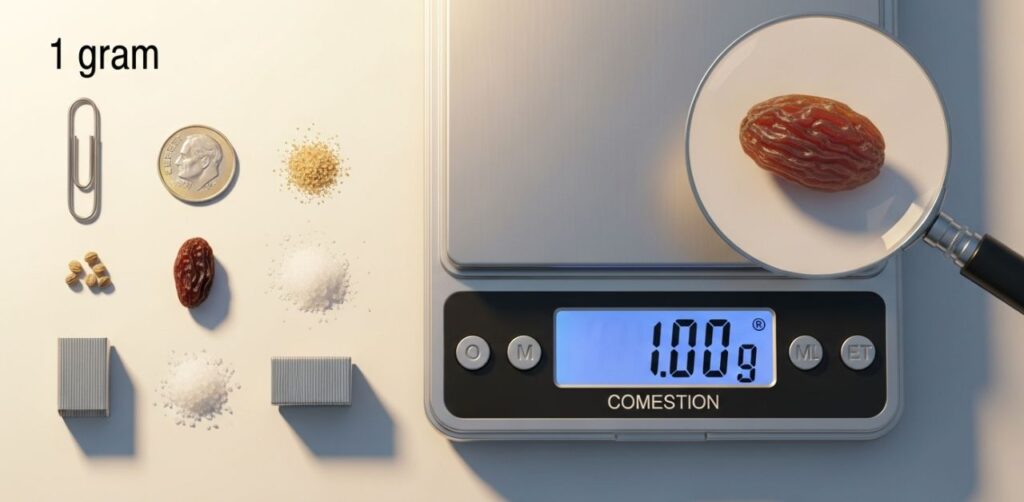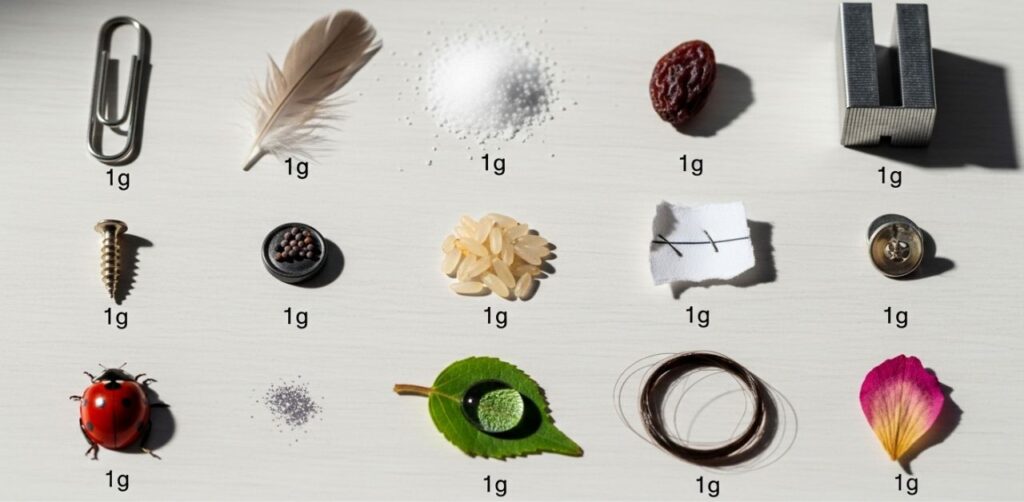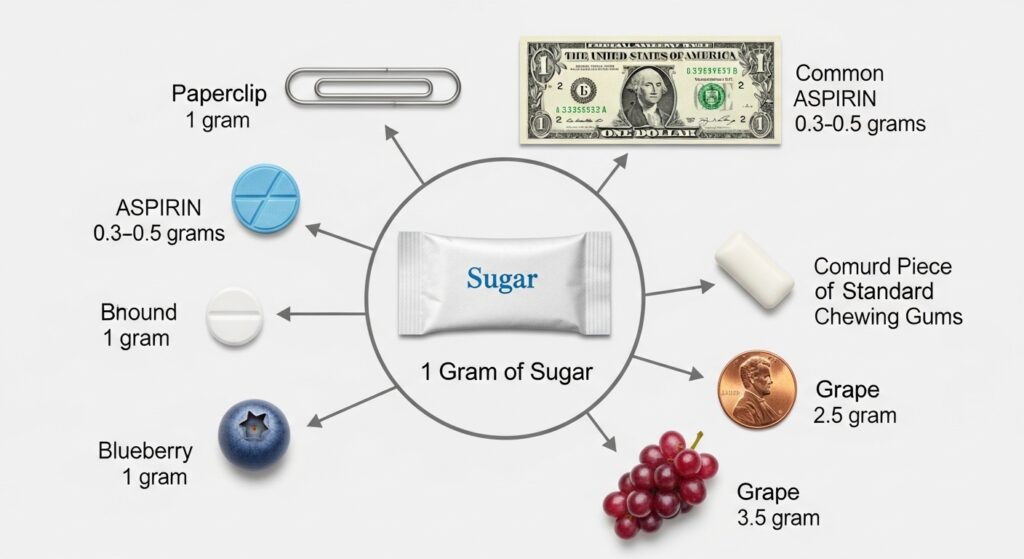Have you ever wondered what weighs 1 gram? It might sound like a tiny and almost invisible weight, but understanding things that weigh 1 gram can actually help indaily life from kitchen measurements to science experiments and even learning the metric system.
When you think of common items that weigh 1 gram, you might imagine something as light as a paperclip or a raisin. Surprisingly, these everyday objects weighing 1 gram are all around us you just have to notice them.
In this article, we’ll explore 15 real-life examples of 1 gram weight, explain how heavy is 1 gram, and show you easy ways to visualize a gram without using a scale. Let’s dive in!
| # | Item | Notes |
|---|---|---|
| 1 | Paperclip (small) | ≈1 gram |
| 2 | US Dollar Bill | About 1 gram |
| 3 | Thumbtack | Around 1 gram |
| 4 | Raisin | Roughly 1 gram each |
| 5 | Small Feather | About 1 gram |
| 6 | 1 mL of Water | 1 milliliter = 1 gram |
| 7 | Large Postage Stamp | Close to 1 gram |
| 8 | Business Card | About 1 gram |
| 9 | Small Button | ≈1 gram |
| 10 | 1/4 Teaspoon of Sugar | Around 1 gram |
| 11 | Almond (single) | About 1 gram |
| 12 | Small Safety Pin | Close to 1 gram |
| 13 | Birthday Candle | Around 1 gram |
| 14 | Small Bead | ≈1 gram |
| 15 | Dollar Coin (light token size) | Some novelty tokens weigh ~1 gram |
What Does 1 Gram Mean in Simple Terms?

In simple terms, 1 gram is a unit of mass in the metric system, equal to one-thousandth of a kilogram.
To put that in perspective:
- 1 gram = 0.001 kilograms
- 1 gram ≈ 0.035 ounces
So, when you ask “how heavy is 1 gram?”, think of it as a very lightweight measurement example barely noticeable when you hold it in your hand.
Visualizing 1 gram weight can be helpful:
- A small paperclip
- A single raisin
- About 1 milliliter (1 ml) of water
These tangible examples of 1 gram help make the concept more practical and easy to understand, especially for beginners learning metric conversions or doing science experiments.
Why Understanding 1 Gram Matters

Knowing what objects that weigh 1 gram look or feel like can make a big difference in everyday situations.
Here’s why it’s useful:
- In cooking: Helps with kitchen measurements for spices or powders.
- In education: Great for science projects or teaching unit of mass concepts.
- In DIY or crafts: Helpful for measuring lightweight materials precisely.
In short, understanding 1 gram everyday items improves your measurement accuracy and helps you estimate small-scale weights even without a scale.
15 Common Things That Weigh 1 Gram

Here are 15 common household items that weigh about 1 gram some might surprise you!
- A Paperclip The most classic 1 gram reference object, found in almost every office.
- A Dollar Bill Lightweight and thin, a perfect example of 1 gram weight.
- A Raisin A small, everyday food item weighing roughly 1 gram.
- A Thumbtack A tiny household object often used on corkboards.
- One Milliliter of Water Scientifically, 1 ml water equals 1 gram, making it a great measurement reference.
- A Single Grape Small grapes typically weigh around one gram each.
- A Quarter Teaspoon of Sugar Perfect for kitchen measurement examples.
- A Small Postage Stamp Common lightweight paper item weighing about 1 gram.
- A Feather Depending on type, some small feathers weigh close to a gram.
- A Dollar Coin (Canadian) Certain thin coins weigh right around 1 gram.
- A Jelly Bean A fun, sweet example of small things that weigh 1 gram.
- A Coffee Bean Great for baristas learning weight accuracy in brewing.
- A Pen Cap Some plastic pen caps weigh about a gram.
- A Push Pin Tiny but sharp, a useful 1 gram everyday item.
- A Small Paper Square (1” x 1”) Depending on thickness, a tiny paper square often hits 1 gram.
How to Measure 1 Gram Without a Scale
You might wonder: “How can I measure 1 gram at home?” Here are easy ways to estimate 1 gram without professional tools:
- Use Reference Objects Compare with paperclips, raisins, or sugar for a close match.
- Use Kitchen Spoons ¼ teaspoon of salt or sugar is nearly 1 gram.
- Use Water as a Guide Since 1 milliliter of water = 1 gram, fill a small dropper or syringe to measure accurately.
- Group Comparison Measure larger quantities (e.g., 10 grams) using ten small 1 gram items.
- Mobile Scale Apps Some digital scale apps use your phone’s sensors for approximate weight estimation.
These practical tips make estimating 1 gram simple and fun to try at home, especially when learning metric system basics.
1 Gram in Comparison: How Small Is It Really?

To truly understand how small one gram is, compare it to familiar weights:
| Measurement | Weight Equivalent | Comparison Example |
| 1 Gram | 0.035 Ounces | One paperclip |
| 5 Grams | 0.176 Ounces | One teaspoon of sugar |
| 10 Grams | 0.35 Ounces | Two coins |
| 100 Grams | 3.5 Ounces | A medium-sized bar of soap |
So when you visualize 1 gram weight, imagine holding something barely heavier than a leaf. It’s light, practical, and surprisingly useful as a small-scale measurement reference.
Practical Uses of 1 Gram in Daily Life
Even though 1 gram seems small, it’s essential in many real-life scenarios:
- Cooking & Baking: Helps measure spices or powders precisely.
- Pharmaceuticals: Used in medicine dosage where exact measurement matters.
- Education: Perfect for science lab experiments or metric learning activities.
- DIY Projects: Ideal for balancing lightweight parts or craft items.
These everyday applications of 1 gram show how tiny weights can have big importance.
Read this Blog: https://trendsoras.com/how-long-is-2-inches/
Frequently Asked Questions
What weighs exactly 1 gram?
A paperclip, raisin, or 1 ml of water each weighs about 1 gram.
How can I measure 1 gram without a scale?
Use reference objects like paperclips or measure 1 ml of water as it equals 1 gram.
What household items weigh 1 gram?
Thumbtacks, coffee beans, postage stamps, and sugar are household items that weigh 1 gram.
Is 1 gram heavy?
Not at all it’s very lightweight. You can barely feel one gram in your hand.
What does 1 gram of powder look like?
About ¼ teaspoon of sugar or flour is roughly 1 gram in volume.
Conclusion
Now that you know 15 common things that weigh 1 gram, you can easily visualize, measure, and estimate small weights in your daily life. From a raisin to a paperclip, these tiny examples of 1 gram make understanding metric measurements both fun and useful.
So next time you wonder, “what does 1 gram look like?”, just reach for any of these common 1 gram household items they’re right in front of you!
Start practicing your measurement skills today and master the art of estimating 1 gram without a scale!
